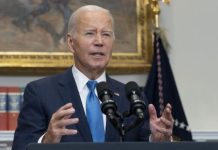Jan. 12 (UPI) — A federal judge on Tuesday blocked the Justice Department from executing two death row inmates this week as they recover from COVID-19.
District Judge Tanya Chutkan of the District of Columbia issued a preliminary injunction in effect through March 16 in the executions of Dustin Higgs and Corey Johnson. The inmates’ lawyers asked for stays after their clients came down with the novel coronavirus in December.
ohnson, 52, was scheduled to receive a lethal injection Thursday at the U.S. Penitentiary in Terre Haute, Ind., for his role in a Richmond Va., drug gang tied to 10 murders.
Higgs 55, was set to die Friday in Terre Haute for the 1996 murders of three women in Maryland.
Chutkan wrote that the public interest was not best served by executing inmates with COVID-19, saying that the death penalty should be imposed consistent with the Constitution. Additionally, she said, carrying out the lethal injections during a COVID-19 outbreak at the prison would put those attending the executions at risk.
“The court is deeply concerned that the government intends to execute two prisoners who are suffering from COVID-19 infection, particularly given that the disease impacts individuals in drastically different ways and can have particularly devastating long-term effects, even for those with mild symptoms,” she wrote.
“This is irresponsible at best, particularly when a temporary injunction will reduce these risks.”
Attorneys for the two inmates hailed Chutkan’s ruling.
“The district court correctly ruled that the government may not put Corey at risk of suffering the excruciating pain of flash pulmonary edema as a result of the disease the government itself exposed him to,” Johnson’s attorney, Donald Salzman, said.
“The government’s super-spreader executions led to Dustin Higgs contracting COVID-19, and he is still experiencing many debilitating symptoms of the disease, including worsening of pre-existing health issues,” attorney Shawn Nolan said.
President-elect Joe Biden, who takes office Jan. 20, has said he’d work to pass legislation to eliminate the death penalty at the federal level.
Johnson was sentenced to death in 1993 for 10 murders tied to his participation in a Richmond, Va., drug gang. Accomplices James Roane and Richard Tipton also received the death penalty for their involvement.
Johnson’s lawyers said a childhood of abuse and neglect led to intellectual disability, and at age 13, his mother put him in a facility for children with intellectual and emotional impairments.
The lawyers also described Johnson’s punishment as “arbitrary” because another accomplice, Vernon Thomas, received a life sentence because of his intellectual disability.
Higgs and an accomplice, Willis Haynes, were convicted in 2001 of the murders of Tanji Jackson, Tamika Black and Mishann Chinn.
The U.S. Justice Department said Higgs had invited the three women over to his Maryland apartment with Haynes and a third man. Prosecutors said that after Jackson rebuffed an advance by Higgs, he offered to drive the three women back to Washington, D.C.
Instead, prosecutors said he drove the women to a secluded area in Patuxent National Wildlife Refuge in St. George’s County, Md., and told Haynes to shoot them. All three women died of gunshot wounds.
Higgs’ defense team called their client’s death sentence “arbitrary and inequitable” because Haynes, who pulled the trigger, was spared the death penalty and received life in prison.
Higgs and Johnson were the last two federal inmates scheduled to be executed during the Trump administration.
Lisa Montgomery, the only woman on federal death row, was scheduled to be executed Tuesday, but a federal appeals court gave her a stay. Court rulings in her case were still pending Tuesday night.






